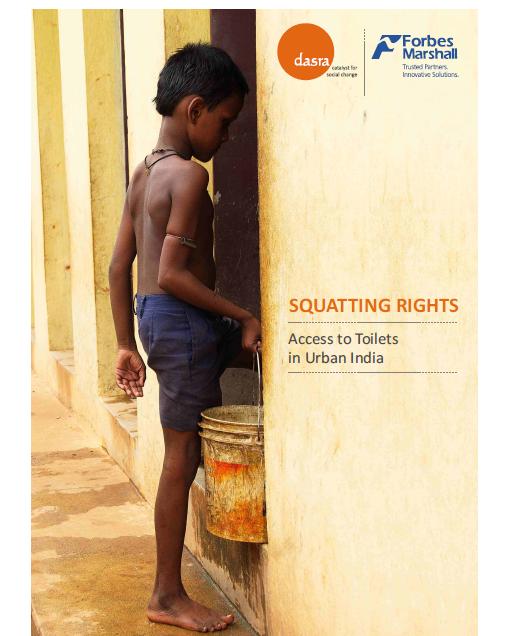Society, Culture, Religion and History
Privatised industrial water supply in Dewas: A case study of impacts and conflicts- A paper by Manthan Adhyayan Kendra
Posted on 11 Oct, 2012 12:22 PMThis paper by Manthan Adhyayan Kendra is a case study on the role of public private partnership in industrial water supply in a industrial town of Dewas in Madhya Pradesh.
Squatting rights - Study by Dasra highlights the issue of access to toilets in urban India
Posted on 10 Oct, 2012 08:11 PM Dasra, a strategic philanthropy foundation in collaboration with Omidyar Network and
Dasra, a strategic philanthropy foundation in collaboration with Omidyar Network and
"Protests rock Cauvery basin as Karnataka releases water to Tamil Nadu in keeping with Supreme Court directive" - Roundup of the week's news (24-30 September 2012)
Posted on 09 Oct, 2012 04:10 PMProtests rock Cauvery basin as Karnataka releases water to Tamil Nadu in keeping with Supreme Court directive
Provisional population totals of National Capital Territory of Delhi- Districts and sub-districts- Data by Ministry of Home Affairs
Posted on 02 Oct, 2012 01:08 PMThis document by Ministry of Home Affairs provides provisional statistical data on population totals of National Capital Territory of Delhi- districts and sub-districts.
Caste discrimination in disaster situations in India - Reports by National Dalit Watch
Posted on 21 Sep, 2012 11:00 AMThe National Dalit Watch (NDW), an effort spearheaded by the National Campaign on Dalit Human Rights has prepared a number of reports on rampant caste discrimination and the urgent need for protection of human rights, particularly Dalit human rights during disaster situations.
"Quotes from the Earth" film festival, Toxics Link and India International Centre, December 6-7, 2012, New Delhi
Posted on 20 Sep, 2012 07:09 PMOrganiser: Toxics Link and India International Centre
Venue: India International Centre
#40, Max Mueller Marg
New Delhi


Toxics Link is an information outreach and environmental advocacy organization set up in 1996. It has special emphasis on reaching out to grassroots groups and community based organizations. The areas of its engagements include research, outreach and policy advocacy on issues of communities and urban waste, toxics free healthcare, hazardous wastes, and pesticides. Toxics Link communicates with all stakeholders, from a civil society perspective. Its networks and partners are national, regional as well as international.
India International Centre is a non-government institution widely regarded as a place where statesmen, diplomats, policy makers, intellectuals, scientists, jurists, writers, artists and members of civil society meet to initiate the exchange of new ideas and knowledge in the spirit of international cooperation. Its purpose, stated in its charter, was ‘to promote understanding and amity between the different communities of the world’. In short, the Centre stands for a vision that looks at India as a place where it is possible to initiate dialogues in an atmosphere of amity and understanding.
National water framework law – An explanatory note developed by the Sub-Group of Planning Commission’s Working Group on Water Governance for the Twelfth Plan
Posted on 19 Sep, 2012 05:30 PMThis explanatory note by the Planning Commission on the national water law begins with an account of why a national water law is necessary.
"Kund - Etijyomoyer jaler etijyo" - Bengali translation of Anupam Mishra’s book by Nirupama Adhikari, about the kunds of Rajasthan
Posted on 19 Sep, 2012 03:20 PMRainwater harvesting is the new buzzword for a world wracked by climate change and increasingly limited stores of fresh water. But in rain-starved Rajasthan, communities have been harvesting water for ages.
Dr Anupam Mishra’s booklet , “Kund - Etijyomoyer jaler etijyo”, a Bengali translation of the original in Hindi, describes the ideas and principles that lie behind this legacy of conserving water in an environment bereft of this precious natural resource.

"Lapodia - Ekti drishtanto" - Bengali translation of Anupam Mishra's booklet by Nirupama Adhikary, about the successful efforts of Lapodia village in Jaipur, Rajasthan in harvesting rainwater
Posted on 19 Sep, 2012 02:57 PMCollective community efforts can help overcome the vagaries of nature and rejuvenate pastures and farms to restore prosperity, says Dr Anupam Mishra in his booklet outlining a case study of Lapodia, a village in Rajasthan.

Nectar of immortality: A film on the Kumbh Mela and its people
Posted on 18 Sep, 2012 10:03 AM'Amrit: Nectar of Immortality' is a film shot during the Kumbh Mela in Haridwar in 2010. Reputed to be the biggest such gathering of people, the Mela attracted 50 million people.





